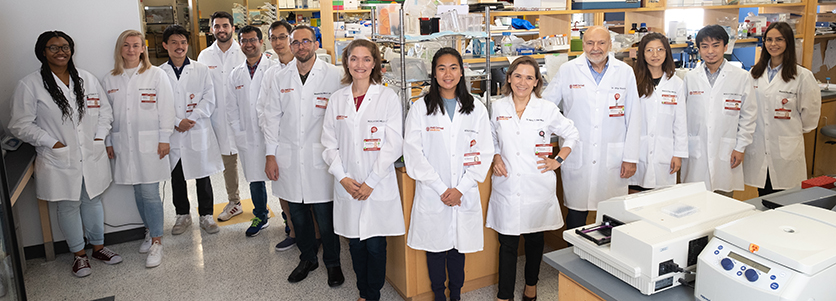Contact Information
Jorge Moscat, Ph.D.
Vice Chair for Experimental Pathology
Homer T. Hirst III Professor of Oncology in Pathology
Rockefeller University
The signaling pathways that regulate inflammation and cell proliferation, and their interface with autophagy and metabolism, are central to the control of tumor initiation and progression as well as in the development of metastasis. The Moscat laboratory studies these processes in the context of the crosstalk between the tumor epithelium, the tumor stroma, and its immunological microenvironment. Emphasis is placed on colorectal and liver cancer. The lab pays particular attention to the role and mechanism of action of several key signaling molecules, which include the autophagy and signaling adapters p62 and NBR1, and their binding partners, the atypical protein kinase C isoforms PKCζ and PKCλ⁄ι. The study of these fundamental biological questions results in the identification of non-oncogenic vulnerabilities that will lead to the design of more efficacious and less toxic anti-cancer therapies by targeting not only the epithelium but also the tumor stroma.
Weill Cornell Medicine published Newsroom article on our research. Read it here!
PI: Jorge Moscat, PhD
The goal of this proposal is to investigate the role and mechanisms of action of p62 and NBR1 in the activation of hepatic stellate cells, and their impact during NASH and liver cancer development.
R01DK108743 NIH/NIDDK
PI: Jorge Moscat, PhD
This project will address the mechanisms through which p62 drives HCC development, focusing on the roles of NRF2 and mTORC1 as p62 effectors. Small molecules that interfere with p62-driven NRF2 and mTORC1 activation will be developed and evaluated their ability to prevent obesity-induced HCC in appropriate mouse models.
R01CA211794 NIH/NCI
PI: Jorge Moscat, PhD
The scope of this study is to investigate the role and mechanism of action of PKCλ⁄ι as an essential regulator of autophagy and cell death in intestinal cell homeostasis and inflammation-driven tumorigenesis.
R01CA207177 NIH/NCI
PI: Jorge Moscat, PhD
The scope of the proposed project is to identify inhibitors of PHGDH, a cancer metabolism target.
16X113-PHGDH NCI-NeXT Program
PI: Jorge Moscat, PhD
The scope is to test the effect of PVHA in serrated tumors.
RCA 19-02 Haloyme, Inc.
PI: Jorge Moscat, PhD
National Institutes of Health (R01)
Co-PI: Jorge Moscat, PhD
WCM Prostate Cancer SPORE Developmental Research Program
PI: Jorge Moscat, PhD
National Institutes of Health (R01 grant)
PI: Maria Angeles Duran Molina, PhD/Jorge Moscat, PhD (Unit Director)
National Institutes of Health (R50 grant)

Jorge Moscat, Ph.D.
Vice Chair for Experimental Pathology
Homer T. Hirst III Professor of Oncology in Pathology
Rockefeller University